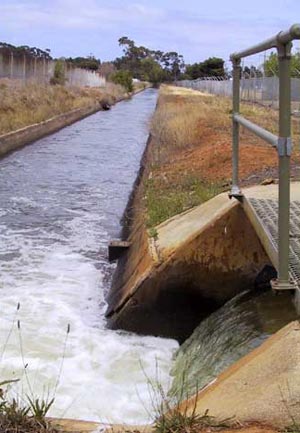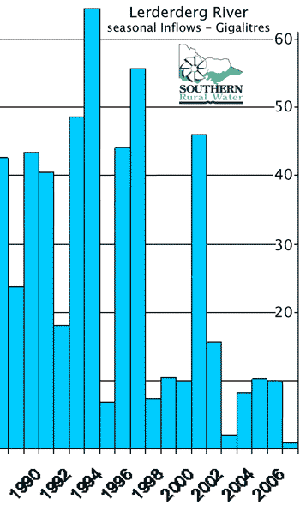|
|
The deep aluvial soils of the Werribee delta have fed the city of Melbourne since the early nineteenth century. The dams and irrigation infrastructure, built by earlier generations to supply Melbourne’s growing western suburbs, are now holding only 7% of capacity.
River flows dropped as the drought began in the late 1990’s and in the summer of 2003, many turned to bore water to top-up their crops water needs. Regrettably, too much groundwater was extracted and seawater may have intruded into the aquifer as some crops close to the bay were lost. Water authorities acted swiftly to protect the groundwater system and in the end banned the use of ground water on vegetable crops. Relief came in early 2004 when Maffra dairy farmers transfered 2,000 megalitres of their water entitlements from the Thompson dam to save the food crops at Werribee. Recycled water also became available with a $20 million purification plant upgrade and supply pipeline. The recycled water has a high salt content due to the nature of western industrial and domestic wastewater and the seepage of saline groundwater into sewers.
Further improvements will come as more industries reduce their wastewater burden. Households can help by using low sodium laundry detergent. Until the salinity issue is resolved, recycled water must first be blended with fresh water before it is used on vegetable crops. Vegetable growers are also using gypsum to reduce the long-term effects of the saline water on their soils. Desalination can remove the salt from wastewater but the $300+ million construction cost and $3000/ML to treat industrial wastewater, cannot be borne by vegetable growers alone.. Emergency water transfers from the Thompson dam remain an option, though residential users clearly have first priority. But all Victorians are waiting for this long drought to finally break so we can once again enjoy the benefits of reliable local food production. |
|
 Vegetable growers use almost 12GL from the Werribee River each year and a further 2GL from
Vegetable growers use almost 12GL from the Werribee River each year and a further 2GL from 